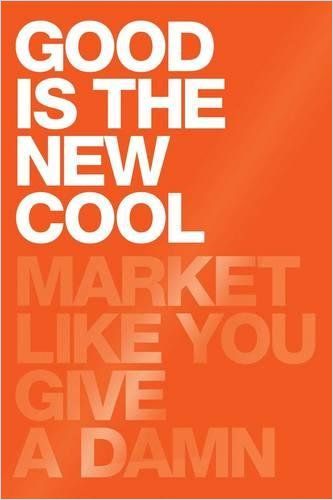Afdhel Aziz and Bobby Jones offer impassioned advice for marketers and businesses that understand the need to do well by doing good.

A Call to Profitable Action
In this inspirational report, “brand-purpose” consultant Afdhel Aziz and Peace First marketer Bobby Jones detail what’s now cool about goodness and what this trend portends for commerce, philanthropy, and a kinder, more charitable world. They report that many companies are now finding that societal value ranks close to shareholder value.
“Good Is the New Cool”
Astute companies combine profitable business with an aware, charitable corporate culture. The many organizations that invest energy and money into doing good include TOMS, Tesla, Etsy, Kickstarter, Patagonia, Ben & Jerry’s, Zappos, the Honest Company and Warby Parker.
We are witnessing a seismic shift in popular culture – one where doing ‘good’ has become its own form of ‘cool’.Afdhel Aziz and Bobby Jones
Technology now enables companies to pursue innovative new avenues for social service, a distinction as information overload threatens the effectiveness of traditional marketing. The authors report that marketing messages gain stature when their promotions support a noble purpose.
They also find that younger customers – notably millennials and generation Zs – prefer to purchase from firms that contribute to social well-being.
Warby Parker
The eyeglass merchant Warby Parker is so popular that its Soho store has been known to need velvet ropes and security guards to manage customers who line up to get inside. Warby Parker offers reasonably priced, thoughtfully designed, retro style eyeglasses for $95 a pair.
True purpose is always in service to something bigger than yourself.Afdhel Aziz and Bobby Jones
For every pair of eyeglasses it sells, Warby Parker donates a pair to a person in need. It works through the nonprofit VisionSpring, which provides eyewear in developing countries. Warby Parker has donated more than two million pairs of eyeglasses.
The company’s word-of-mouth marketing is so strong that half the customers who visit its website do so at a friend’s recommendation. Even though it was founded only in 2010, Warby Parker has accrued a value of more than $1 billion as the ultimate “purpose driven business.”
Young Money
Millennials and Generation Z customers have an outsized influence on what sells. The United States alone has 80 million millennials, and worldwide, this cohort spends $2.45 trillion annually. Gen Z, which also numbers 80 million, spends $44 billion annually, although that impact rises to $200 billion if you consider its influence on its parents’ spending. Young buyers prefer quality products and insist on quality experiences. They believe in social activism and cause marketing.
Marketing has always implemented four Ps: product, price, place and promotion. Now it must implement a fifth: purpose. And purpose is cool.
For example, consider the DoSomething organization, a purposeful nonprofit with five million members. It connects sponsors and young volunteers with more than 275 different “cause campaigns” centered around various issues, including gun violence, homelessness, sexual assault and the environment.
People are hungry to get involved in something that is meaningful, something that is bigger than themselves.Laura Probst, Honest Company, head of social goodness
Renowned clothing designer Alexander Wang works with the nonprofit on DoSomething branded fashions; half the proceeds from the sale of these clothes support the charity.
Today, young people receive valuable assistance from older generations in creating “conscious capitalism.” This evolution in business depends on “conscious marketing,” which moves beyond profits and shareholder value to embrace a larger mission: optimizing life. Meeting that goal is inspiring a new generation of capable, professional promoters. These New Age marketers value the hard business realities of finance, R&D, sales and marketing. They also champion consumers who want to support socially responsible businesses.
Strategic Principles
Every company needs a purpose and should be able to define it. For example, Disney’s purpose is to “create happiness by providing the finest in entertainment for people of all ages, everywhere.”
However, as you spread the message of your purpose, be aware that most consumers have learned to differentiate between credible and illegitimate messages. If you claim your brand helps the world, be sure you can prove it. Line up allies to help you fulfill your purpose, including nonprofits that know how to fix the problems you care about and partners who can foster societal change.
If you want to go fast, go alone. If you want to go far, go together.African proverb
People expect to be on the receiving end of marketing, but ubiquitous ad blockers now increase the difficulty of finding an audience. Positive word of mouth is the most effective way around this blockade. If you treat your customers only as consumers, your relationship will be one-dimensional. If you treat your customers as citizens who care about a meaningful purpose, you can share rich, multidimensional relationships. Develop a cool, worthwhile product or service with great design and a compelling story.
An Action Plan
You’re not the only person in your organization who wants to do good. Find the others and form alliances within your company. You may not be sure where to put your efforts. Experiment. Doing good can be an iterative process.
Determine what you should do by determining how you would feel if someone else did the same for you. Communicate online about your company’s charitable work. Your messages will inspire other people to follow your example.
In today’s world, the holy grail of marketing is positive word of mouth.SOURCE
When you network with other marketing professionals and businesspeople online, share what you have learned. They may follow your worthwhile path and refocus their marketing to serve an elevated mission.
Corporate leaders must go beyond business as usual and reach for transformation rather than transactions by pursuing new ideas, solutions and models. Good will remain cool only if sufficient people in business commit their time, money and drive to helping others. Everyone shares this responsibility.
Idealistic and realistic
Afdhel Aziz and Bobby Jones are not pie-in-the-sky idealists; they built companies doing exactly what they espouse in this inspirational, idealistic, realistic guide. They demonstrate keen understanding of the younger demographics that dominate today’s markets and make a convincing case that corporate survival depends on doing good. The tactics they recommend are applicable, sound, varied and hard-nosed. This self-help book for companies includes pragmatic, actionable guidance. Start-ups and established companies looking to change their brand message will benefit from Aziz and Jones’ original, worthwhile advice.
Aziz and Jones also co-wrote Good Is the New Cool: The Principles of Purpose. Aziz, founder and chief purpose officer at Conspiracy of Love, a brand-purpose consultancy, also wrote China Bay Blues. Jones is the chief marketing and communications officer of Peace First, which works with young people in more than 100 countries create solutions to local and global problems.













